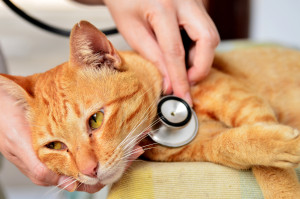Keep your family pets away from these toxins
By Ed Cohen, DVM
Every home has an array of toxins that could potentially harm your pet. Knowing what can be harmful and what to do if your pet is exposed to any of these toxins can help to avoid a tragic situation. Although this list includes some of the most common toxic exposures seen in pets, it’s not all-inclusive. If in doubt as to whether your pet may have been exposed to a toxin, please call your local veterinarian for advice.
Rodenticides are often spread around outside one’s home to kill mice and rats. There are two main types: anticoagulants that, when ingested by a pet, cause bleeding, lethargy, anorexia, difficulty breathing, vomiting blood, and lameness. The other type creates an increase in blood calcium, resulting in increased thirst and urination, anorexia, and vomiting.
Ethylene glycol is the main ingredient in engine coolant or antifreeze. As little as one teaspoon can be fatal to a cat and only in somewhat larger amounts to a dog. Symptoms are drunk like behavior, vomiting, and rapid breathing.
Bone and blood meal are often used as soil amendments. Many pets are attracted to the aroma, and if they are allowed to consume substantial amounts, a “ball” of bone or blood meal may form in their stomachs, causing an obstruction.
Fire-starter logs, if consumed, will often cause a foreign-object gastrointestinal obstruction that requires surgery to remedy.
Corrosive cleaning products, such as toilet bowl cleaners, etching compounds, pool sanitizers, dish-washing detergents, drain openers, and radiator cleaners all can cause painful burns to the esophagus and upper-digestive tract. Do not induce vomiting if your pet ingests any of these substances, as throat or lung damage can result. Call the vet immediately.
Hydrocarbons such as kerosene, engine oil, tiki-torch fuels, gasoline, diesel fuel, paint solvents, wood-staining compounds, lighter fluid, wood strippers, etc., are very irritating to the gastrointestinal tract. Again, do not induce vomiting.
Batteries are often swallowed by dogs when they chew up the TV remote control. They can cause rapid and severe ulceration and heavy metal poisoning.
Household plants comprise a large and diverse category. It’s beyond the scope of this article to discuss the many individual plants. Among the more common seriously toxic plants are various lilies and the sago palm, which is a common outdoor ornament.
Food such as raisins, grapes, chocolate, and onions can be toxic if sufficient ingestion occurs.
Teflon-coated and other nonstick pans, when overheated, give off an odorless, invisible gas that is rapidly fatal to pet birds.
Sugar-free gum containing the artificial sweetener Xylitol will cause kidney failure if sufficient amounts are ingested.
Medications such as antidepressants sleep aids, nonsteroidal anti-inflammatory medications (such as aspirin, ibuprofen, acetaminophen, naproxen, and Celebrex), amphetamines for ADHD and weight loss, and topical anticancer medications are toxic to various degrees.
If you suspect your pet may have been exposed to any of these toxins, proceed as quickly as possible with your pet to your local or emergency veterinarian for assessment and treatment. Bring the substance’s container or package with you.
Related posts
Leave a Comment
You must be logged in to post a comment.







